Testing The Temperature 14
What do voters in Northern Ireland think about the Windsor Framework and UK-EU Relations?
October 2025
David Phinnemore[1] and Katy Hayward[2]
This report is available to download here:
Executive Summary
- Most voters in Northern Ireland are either generally accepting of or supportive of the Windsor Framework. However, support is weakening.
- 48% of respondents regard the Windsor Framework as ‘on balance a good thing for Northern Ireland’. This is down from 50% in the previous two polls, and the lowest level since June 2021.
- There has been a slight increase in those who are ‘neutral’ or undecided on the question (16%, compared to 13% in the April poll).
- 52% see the Windsor Framework as an appropriate means for managing the effects of Brexit on Northern Ireland. This is significantly below the 60% in February 2024 and at pre-2023 levels.
- Opposition to the Windsor Framework has remained steady (34-37%) – since it was adopted in February 2023, to modify the implementation of the Protocol on Ireland/Northern Ireland. The exception was in Spring 2024, after the announcement of Safeguarding the Union deal, when opposition dropped to 29%.
- In the latest poll, 36% of respondents disagree that the Windsor Framework is ‘on balance a good thing’ for Northern Ireland and 35% of respondents disagree that it is an appropriate means of managing the effects of Brexit on Northern Ireland.
- There has been an improvement in views of the impact of the Windsor Framework on UK-EU relations: 45% currently view this impact as positive, up from 41% in April, no doubt encouraged by the announcement of the UK-EU ‘Common Understanding’ in May 2025. 35% view the impact as negative, with 20% ‘neutral’ or undecided.
- Voters continue to view the impact of the Windsor Framework on political stability in Northern Ireland as being more negative (42%) than positive (35%). This remains significantly narrower than in October 2023 (55% negative, 26% positive).
- 46% of respondents think the Windsor Framework is having a positive impact on the Northern Ireland economy (down from 54% in June 2024); 36% disagree (up from 28% in June 2024).
- 61% think the Windsor Framework offers unique economic opportunities that could benefit Northern Ireland (down from 68% in June 2024).
- More voters continue see the impact of the Windsor Framework on Northern Ireland’s place in the UK internal market as negative (44%) rather than positive (29%) – a clear reversal of the situation in February 2024 (41% positive, 34% negative).
- More voters see the impact of the Windsor Framework on Northern Ireland’s constitutional place in the UK as negative (46%) than positive (18%). The gap is considerably wider than in October 2023 (43% negative, 29% positive).
- Voters view the impact of the Windsor Framework on British-Irish relations as more positive (40%) than negative (33%); a reversal of the situation in June 2024, when more viewed the current impact as negative (41%) than positive (31%).
- There continue to be mixed levels of trust/distrust in political actors and institutions to manage Northern Ireland’s interests with respect to the Windsor Framework.
- The UK Government is distrusted (73%) as much as the DUP (72%) and is by far the least trusted (9%) of all actors.
- Voters are more likely to trust (43%) that distrust (38%) the European Commission/EU.
- Northern Ireland business representatives continue to be the actors most trusted (52%) to manage Northern Ireland’s interests with respect to the Windsor Framework; 19% of respondents distrust them.
- Regarding trust in political parties with respect to the Windsor Framework: the SDLP and Alliance Party are the most trusted (42% and 38% respectively) but trust in the UUP has dropped considerably (from 37% in February 2024 to 17%).
- With trust in the DUP on this topic sitting at 13%, the TUV is the most trusted of the unionist parties to manage the impact of the Windsor Framework (26%) – although it is distrusted considerably more (62%) than the UUP (50%) but less than the DUP (72%).
- On recommendations arising from Lord Murphy’s Independent Review on the Windsor Framework:
- The most popular recommendation is that the UK government should consider all possibilities to reduce frictions on the movement of goods from Great Britain to Northern Ireland; 44% of respondents ranked it first or second.
- Also popular is that the UK Government and the Northern Ireland Executive should emphasise ‘commercial benefits to Northern Ireland manufacturers of dual market access (38% placed it in their top two priorities).
- On the future of the UK-EU relationship:
- The most highly prioritised area for UK-EU cooperation is in health security cooperation (e.g. to prevent future pandemics and health crises); 55% ranked this in the top four out of ten priorities.
- The second area most voters would like prioritised in the UK-EU relationship is the establishment of a Common Sanitary and Phytosanitary Area; almost a third of respondents (31%) ranked this first or second and 53% placed it in their top four issues.
- Voters were divided on the UK-EU intention to cooperate to reduce irregular migration: 29% ranked it in their top two priorities and 29% ranked it in their lowest two priorities.
Introduction
Since 2021 we have commissioned a series of regular polls to ‘temperature test’ the views of voters in Northern Ireland (NI) on a range of issues relating to Brexit and the Windsor Framework (originally the ‘Protocol on Ireland/Northern Ireland’) and their implications. This is the only polling in Northern Ireland dedicated to the topic of the Windsor Framework. Polls are currently being run every six months
The polls are conducted by LucidTalk using its online Northern Ireland Opinion Panel. LucidTalk have a strong track-record of accurately predicting election and referendum results in Northern Ireland on the basis of polling this Opinion Panel. The results presented here are from a sample of 1201 responses (from a total of 1960 received) to the poll undertaken on 3-6 October 2025.[3] The sample used is weighted to be representative of the adult population of Northern Ireland (e.g. by age, gender, region). All results presented are accurate to a margin of error of +/-2.3% at 95% confidence.
The context for this poll
This fourteenth full poll was conducted more than four years after the original Protocol on Ireland/Northern Ireland entered into force on 1 January 2021, more than two-and-a-half years after the UK and the EU in February 2023 agreed the Windsor Framework on revised arrangements for the implementation of the Protocol, and just over eighteen months after the UK Government of Rishi Sunak agreed the Safeguarding the Union ‘deal’ with the Democratic Unionist Party (DUP) that led to the return of the NI Assembly and a new NI Executive being established in February 2024.
Early polls in 2021-22 were conducted in a context of ongoing contestation and political tensions around the Protocol and often strained UK-EU relations. Since adoption of the Windsor Framework on 23 February 2023, the context has been one of significantly improved UK-EU relations with joint EU-UK bodies overseeing implementation of the Windsor Framework meeting regularly, new bodies being established, and joint commitments to stakeholder engagement being put in place. The return of the NI Assembly has also meant the Windsor Framework Democratic Scrutiny Committee has been established, the Stormont Brake on amendments and replacements to EU law applicable under the Windsor Framework has been available for use, and ‘applicability motions’ adopted with a cross-community majority are now generally required for the UK to agree to new EU legislation being added to the Windsor Framework unless the UK Government believes the act ‘would not create a new regulatory border between Great Britain and Northern Ireland’.
Implementation of the Windsor Framework is ongoing (e.g. the current ‘grace period’ on the supply of veterinary medicines into Northern Ireland expires at the end of 2025). Concerns around the Windsor Framework, particularly among unionist voters, persist. This is despite the Safeguarding the Union deal’s new commitments regarding Northern Ireland’s position within the UK and actions to deliver on them. These have included: new domestic bodies and structures (e.g. a UK East-West Council); UK Government departments giving ‘special regard to Northern Ireland’s place in the UK internal market’ when bringing forward regulation; a UK Government commitment to 'no unnecessary checks within the UK internal market’; and a UK Internal Market Guarantee aiming to ensure that at least 80% of freight movements from Great Britain (GB) to Northern Ireland go through the ‘UK Internal Market System’ (previously the ‘green lane’). Legislation has been adopted implementing most of the commitments.
Since the return of the NI Assembly in 2024 and the establishment of the current NI Executive, MLAs have adopted one ‘applicability motion’ and rejected another on geographical indicators (GIs) for non-agri-food products. They have also held their first ‘democratic consent’ vote on the continued application of much of the Windsor Framework which passed in December 2024 but without a cross-community majority – indeed, all Unionist MLAs voted against it. Consequently, the UK Government commissioned Lord Murphy of Torfaen to conduct an Independent Review of the Windsor Framework.
An attempt by unionist MLAs to activate the Stormont Brake on legislation concerning the packaging and labelling of chemicals was made in December 2024 but rejected by the UK Government. It also announced on 24 April 2025 that it would be agreeing to the EU’s new act on GIs being added to the Windsor Framework despite MLAs not approving an applicability motion; it argued that no new regulatory barrier would be created and so it could proceed.
More generally, the poll took place against the background of the UK Government ‘reset’ in relations with the EU. Of particular significance here was the UK-EU summit on 19 May 2025 that saw the adoption of a ‘Common Understanding’ setting out ‘a renewed agenda’ for UK-EU cooperation. This included commitments on security, defence and development cooperation, energy cooperation, easing the movement of agrifood goods, internal security and judicial cooperation, and cooperation on irregular migration.
The summit also recalled the centrality of the Windsor Framework to the UK-EU relationship and the UK Government’s commitment to its to ‘full, timely and faithful implementation’. The commitment was reiterated in a Joint Statement following a meeting of the EU-UK Specialised Committee on the implementation of the Windsor Framework on 2 October 2025. This noted work still to be completed on implementation as well as the value of stakeholder engagement.
On implementation, new arrangements for the GB-NI movement of parcels and freight came into effect during the summer of 2025, as did the next phase of ‘not for EU’ labelling on 1 July 2025. As with most phases of the Windsor Framework’s implementation, concerns exist about the impact that these are having on businesses and consumers. A report from the Federation of Small Businesses in June 2025 drew attention to impacts. Several MLAs drew on the report in a NI Assembly debate on the Windsor Framework on 8 September 2025. The debate also reflected on Lord Murphy’s report on his review of the Windsor Framework. The report, submitted to the UK Government in July, was published in early September 2025
Participants in the poll on 3-6 October 2025 were asked six sets of questions and offered the opportunity to provide written comments in response to the poll. The questions covered attitudes towards Brexit and the Windsor Framework and assessments of the latter’s impact. As in previous polls, participants were asked to indicate how much they trust different actors to manage Northern Ireland’s interests regarding the Windsor Framework. They were also asked for their views on the relative importance of the Windsor Framework compared to other contemporary concerns, on recommendations arising out of Lord Murphy’s report on the Independent Review of the Windsor Framework, and on priorities for UK-EU relations.
Attitudes to Brexit and the Windsor Framework
This latest polling continues to show most voters in Northern Ireland as either generally accepting or supportive of the Windsor Framework. However, support is weakening compared to previous Testing the Temperature polls and opinion remains divided, with continued opposition among many unionists to its arrangements. Opposition to the Windsor Framework remains firm among around a third of respondents, who predominantly self-identify as ‘strongly unionist’.
Two thirds of respondents (64%) claim a ‘good understanding’ of the Windsor Framework (see Figure 1). This is in line with previous polls in October 2024 and April 2025, so down on previous polls (e.g. 74% in October 2023) and the lowest recorded level across our polls. The proportion of respondents (47%) who think that reliable information exists on the Windsor Framework is slightly higher than in April 2025 (45%) so lower than in February 2024 (54%) but higher than in October 2024 (41%) and above the lowest level recorded (37%) in March 2021.
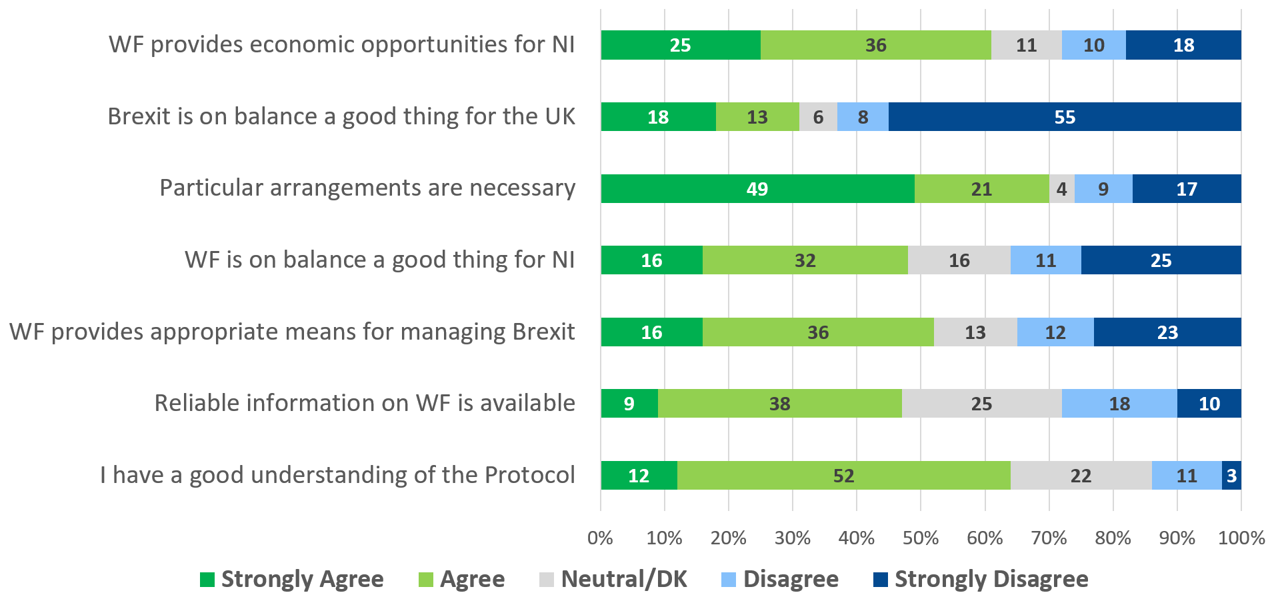
Figure 1. Opinion of Brexit and the Windsor Framework (%)
The clear majority of respondents (70%) continue to agree that ‘particular arrangements’ for Northern Ireland are needed to manage the effects of Brexit. The proportion of all respondents being strongly of this view (49%) has moved back towards the highest recorded level in our polls (51%) in June 2024, having dropped to 44% in April 2025.
The narrow majority (52%) who agree or strongly agree that the Windsor Framework provides an appropriate means for managing the effects of Brexit for Northern Ireland is again markedly below the 60% recorded in February 2024 and more in line with the 53-54% in polls prior to then when the question focused on the Protocol with the ‘grace periods’.
Just under half of respondents (48%) regard the Windsor Framework as ‘on balance, a good thing’ for Northern Ireland. This is lower than in April 2025 (50%) and so down on the 55-56% figures seen in the June and October 2023 and February 2024 polls (see Figure 2). It is at its lowest level since June 2021 (43%). The proportion of respondents who ‘strongly agree’ that the Windsor Framework as ‘on balance, a good thing’ for Northern Ireland’ has fallen to its lowest level in our polls (16%).
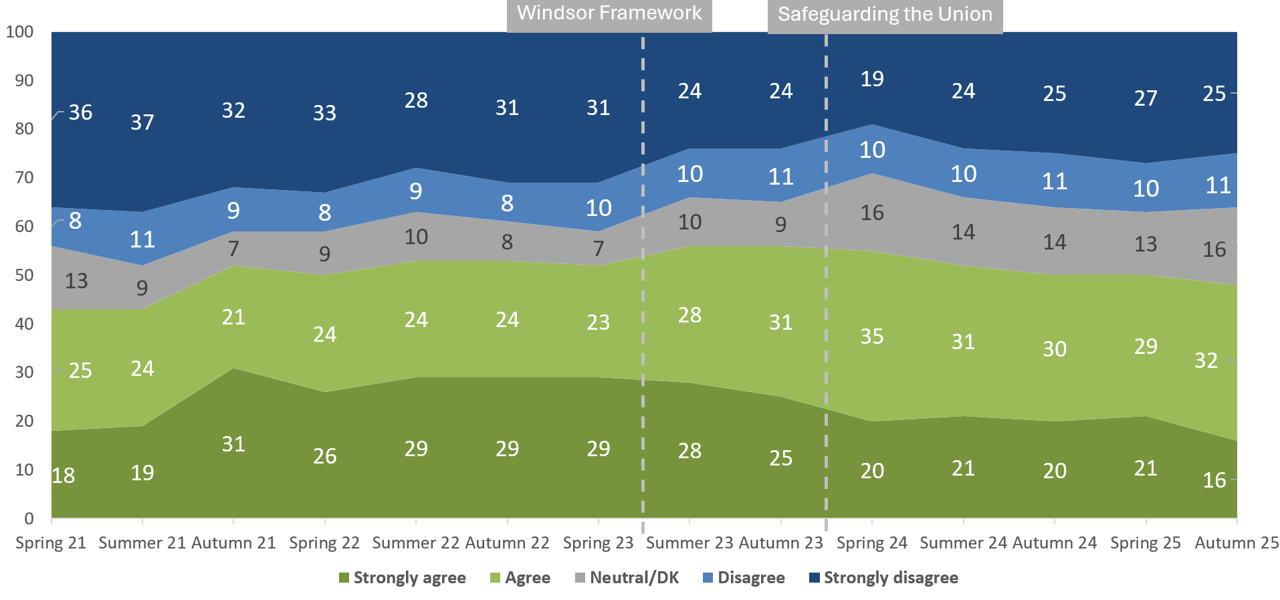
Figure 2. The Windsor Framework is on balance ‘a good thing’ for Northern Ireland (%)
For those disagreeing with the proposition that the Windsor Framework is ‘on balance a good thing’ for Northern Ireland, the overall figure is 36%, so in line with April 2025 (37%), having previously dropped to 29% in February 2024. It remains lower than the immediate pre-Windsor Framework figure in February 2023 (41%). The impact of Safeguarding the Union in tempering some opposition to the Windsor Framework has clearly been reversed.
On whether Brexit itself is on balance ‘a good thing for the UK’, there continues to be a clear majority (63%) who disagree, although the figure remains lower than in October 2024 (66%). The size of the majority is in line with polls conducted in 2023 (e.g. 60% in October). The majority (55%) strongly disagreeing that Brexit is on balance ‘a good thing for the UK’ is among the largest across our polls to date. The proportion of respondents viewing Brexit as on balance ‘a good thing for the UK’ (31%) has dropped since April 2025 (34%) but remains above its lowest level recorded on our polls (26%) in June 2024.
Majority acceptance of the Windsor Framework is also reflected in responses to the question on whether it provides Northern Ireland with a ‘unique set of post-Brexit economic opportunities compared to the rest of the UK which, if exploited, could benefit Northern Ireland’. A majority (61%) agree that there are economic opportunities to be had from the Windsor Framework, with the figure rising since April 2025 (58%) but remaining lower than in February and June 2024 (68%). Slightly more than a quarter of respondents (28%) disagree there are economic opportunities, so at the middle of the range of previous polls (23-34%).
Views on the impact of the Windsor Framework
The poll asked respondents for their assessment of the current impact of the Windsor Framework being implemented (see Figure 3). Important to note here is that the phased implementation of the Windsor Framework removes the ‘grace periods’ for the application of some of the original Protocol’s provisions and replaces them with new ‘green lane’/Internal Market System arrangements for reducing/removing formalities, checks and controls on the GB-NI movement of goods.
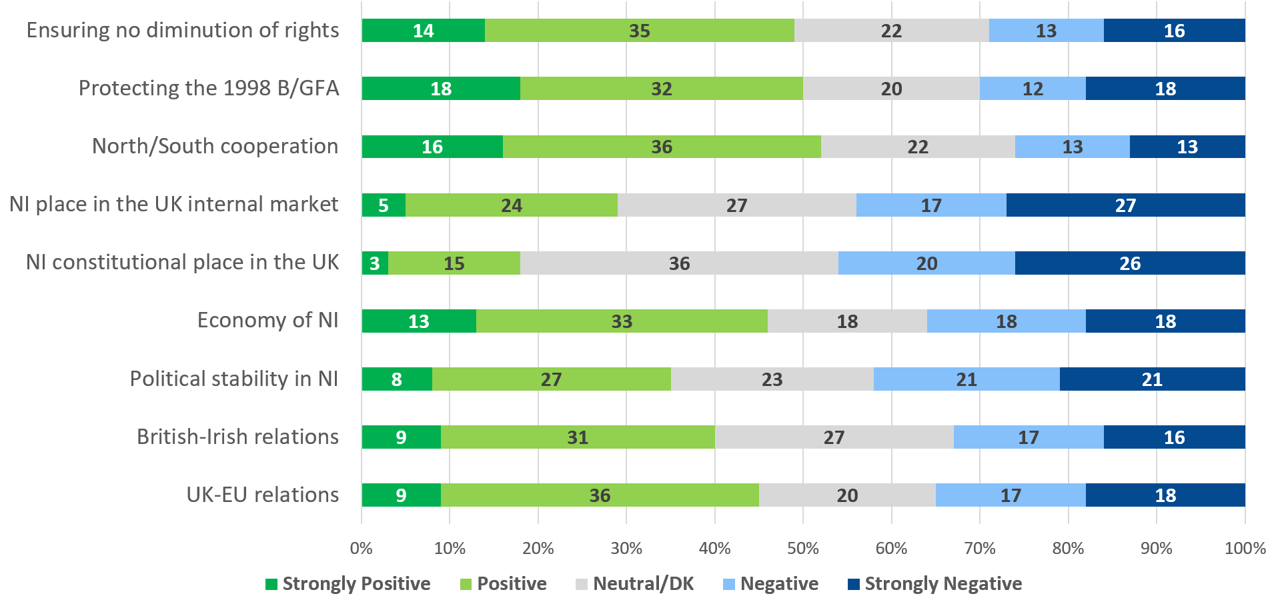
Figure 3. Overall assessment of the current impact of the Windsor Framework (%)
On the question of the impact of the Windsor Framework on the economy of Northern Ireland, under half of respondents (46%) currently view it as positive, so down on February 2024 (56%), and even lower than in February 2023 (50%) (i.e. before the Windsor Framework changes to the implementation of the original Protocol were agreed); 36% view the impact as negative (also close to the February 2023 level of 39%).
Respondents are clearly divided along identity lines. The clear majority of ‘strongly unionist’ voters viewing the impact as negative (81%) is, as in in October 2024, markedly above the level in June 2024 (65%). The proportion of ‘slightly unionist’ voters viewing the impact as positive (24%) has almost halved since October 2024 (46%) and is markedly down on February 2024 (50%). The proportion of nationalist (8%) and ‘neutral’ (15%) voters viewing the impact as negative remains slightly higher than in June 2024 but is very low.
When it comes to Northern Ireland’s relationship with the rest of the UK, the impact of the Safeguarding the Union deal in February 2024 has clearly evaporated. Whereas in February 2024, for the first time, more voters regarded the impact of the Windsor Framework on Northern Ireland’s place in the UK internal market as positive (41%) than negative (34%), this is no longer the case: currently only 29% regard the impact as positive (down from 32% in April 2025) and 44% see it as negative (April 2025: 45%). The overwhelming majority of ‘strongly unionist’ voters (92%) continue to view the impact as negative (up compared to 70% in February 2024 and 80% in June 2024).
Safeguarding the Union saw ‘slightly unionist’ voters move from viewing the impact on Northern Ireland’s place in the UK Internal Market in October 2023 as negative (50%; positive 26%) to the plurality seeing it as positive (44%, to 38% negative) in February 2024. There has been a significant reversal in views over the last two years. In October 2024, 49% of ‘slightly unionist’ voters saw its impact as negative and 35% saw its impact as positive; currently, 54% of ‘slightly unionist’ voters see its impact as negative and only 23% see its impact as positive. More than three-quarters of ‘nationalist’ and ‘neutral’ voters view the impact as either positive or neutral in this regard.
Views on the impact of the Windsor Framework in political terms have typically been more negative. The proportion of respondents seeing the Windsor Framework’s current impact as negative on Northern Ireland’s constitutional position in the United Kingdom (46%) remains in line with previous in April 2025 and in June and October 2024 but notably higher than in February 2024 (37%).
In polls during 2021-23, a majority of respondents (54-68%) saw the Windsor Framework impacting negatively on political stability in Northern Ireland. The figure remains lower (42%) but has risen slightly since April 2025 (39%) when it was its lowest across our polls. 35% of respondents continue to believe that the Windsor Framework is having a positive impact on political stability in Northern Ireland. This change in public opinion no doubt relates more to the fact of Northern Ireland having a functioning Assembly and Executive than to any effect of the Windsor Framework per se.
The latest polling confirms the more positive views on the Windsor Framework’s impact on British-Irish and UK-EU relations that have been present since the Windsor Framework was adopted. In February 2023, a majority of voters viewed the impact of the original Protocol as negative (British-Irish relations – 58%; UK-EU relations – 57%). With the Windsor Framework, the figures for negative impact on UK-EU and British-Irish relations dropped. In this latest poll, a third of respondents view the Windsor Framework as having negative impacts on UK-EU relations (35%) and on British-Irish relations (33%). The proportion of voters perceiving the impact of the Windsor Framework on British-Irish relations to be positive (40%) is unchanged compared to April 2025 and so but lower than in June 2023 (43%). The proportion of voters viewing the impact of the Windsor Framework on UK-EU relations as positive (45%) has risen since April 2025 (41%) and is in line with highest level to date in October 2023 (46%).
Most respondents continue to view the Windsor Framework as having a positive impact on protecting the 1998 Belfast (Good Friday) Agreement. Currently, 50% are of this view. The proportion of respondents who view the impact as negative (30%) is, as in February 2024, the lowest negative figure to date.
On the impact of the Windsor Framework on ensuring ‘no diminution’ of individual rights as set out in the 1998 Belfast (Good Friday) Agreement, 49% of respondents regard it as positive. This is in line with the previous three polls. The proportion of respondents viewing the impact as negative (29%) has fallen slightly compared to polls in May and October 2024 (33% and 32% respectively) and so is closer to the level in February 2024 (27%). Notably, the proportion of voters who see the impact as strongly negative has declined to 16% from 22% in April 2025.
By February 2023, almost equal proportions of respondents viewed the impact of the original Protocol on north-south cooperation as negative and as positive. With the Windsor Framework, a significant shift occurred. By February 2024, 53% were positive and 25% negative; the latest poll confirms a narrowing of the gap (50% positive; 30% negative).
Trust to manage the interests of Northern Ireland vis-à-vis the Windsor Framework
Implementation of the Windsor Framework involves a range of actors. As with all of our previous polls, the only group that is trusted by a majority to manage the interests of Northern Ireland with respect to the Windsor Framework remain NI business representatives (52%) (see Figure 4). More trusted (45%) than distrusted (31%) are also civic society groups (e.g. trade unions).
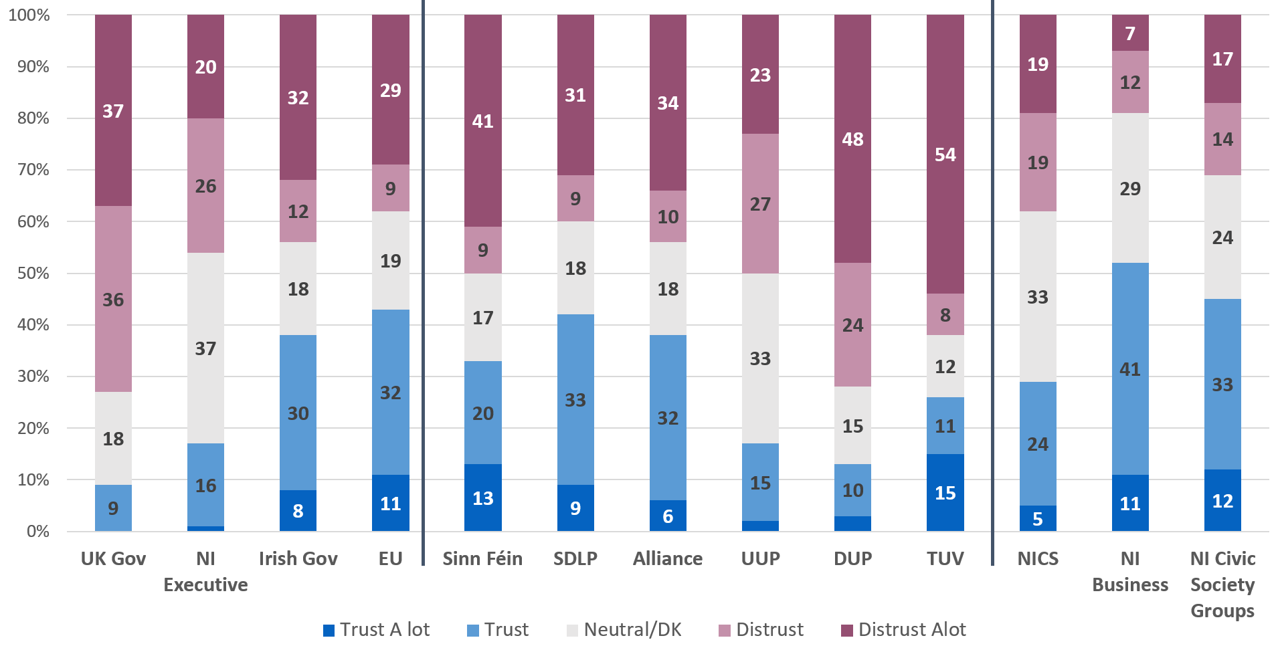
Figure 4. Levels of trust in/distrust of actors to manage the interests of Northern Ireland with respect to the Windsor Framework (%)
Broadly speaking, the picture in this poll confirms that levels of trust and distrust have returned to those of mid-2023, i.e. post-Windsor Framework and pre-Safeguarding the Union. Trust in the UK Government when it comes to managing the interests of Northern Ireland with respect to the Windsor Framework, having dropped to 3% in June 2024 (the same level as in February 2023), is now at 9% (so down on 11% in April 2025). Distrust in the UK Government has increased to 73% having been at its lowest recorded level (68%) in April 2025. 37% of respondents distrust the UK Government ‘a lot’. This is higher than in April 2025 (24%) but a drop from 43% in October 2024.
By contrast, trust in the European Commission/EU to manage the Windsor Framework in the interests of Northern Ireland (43%) remains lower than it was in June 2023 (49%). Distrust in the European Commission/EU (38%) has dropped since April 2025 (42%). Trust in the Irish Government (38%) remains lower than a year ago in October 2024 (43%). Distrust in the Irish Government remains steady at 44%.
Trust in the NI Executive to manage the interests of Northern Ireland with respect to the Windsor Framework (17%) has fallen again compared to February 2024 (25%) but remains marginally higher than in October 2023 (15%). Distrust of the NI Executive stood at 49% in October 2023 but dropped to 37% in February 2024; it is currently at 46%, suggesting, as in April 2025 (48%) that a sizeable portion of voters remain less enamoured by the new NI Executive more than when it was formed.
As in the last four polls, this latest poll inquired into levels of trust/distrust of NI civil servants (NICS). The level of trust (29%) remains well below the level of February 2024 (40%) and below the level of October 2023 (35%). The level of distrust (38%) has fallen slightly compared to the previous polls in April 2025 and October 2024 (42%) but remains markedly higher than in February 2024 (30%).
As for the main political parties in Northern Ireland, the level of trust in the Alliance Party to manage the interests of Northern Ireland with respect to the Windsor Framework has dropped back down to the same level as in October 2024 (38%) when it was at its lowest level across all polls. Its highest level was 50% in June 2022. Trust in the Social Democratic and Labour Party (SDLP) stands at 42% and so still lower than the 46% in February 2024. There has been a notable drop in trust in the Ulster Unionist Party (UUP). Having risen to 37% in February 2024, trust in the UUP fell to 23% in April 2025 and has now fallen again to 17% – its lowest level to date. Correspondingly, levels of distrust in the UUP have risen to 50% compared to 35% in February 2024. It has therefore lost its position as the least distrusted political party, a position now held by the SDLP (40%). The proportion trusting Sinn Féin (33%) remains lower than in June 2024 (38%); distrust in Sinn Féin (50%) has dropped since April 2025 (54%).
Distrust in the DUP to manage the interests of Northern Ireland with respect to the Windsor Framework remains at 72%, having fallen back from 77% in October 2024. It remains higher than in February 2024 (67%) when its Safeguarding the Union deal with the UK Government was announced. Trust in the DUP has again fallen, now to 13%, having previously fallen from 27% in October 2023. Respondents were also asked to consider the extent to which they trust the Traditional Unionist Voice (TUV) to manage Northern Ireland’s interests on the Windsor Framework. Distrust in the TUV remains at 62%, as per the last poll; trust in the TUV, having risen to 30% in April 2025, has fallen to 26%, a level still higher than in February 2024 (20%). More respondents currently trust the TUV than trust either the DUP or the UUP, and fewer respondents distrust the TUV than distrust the DUP. As in October 2024, however, three quarters of ‘strong unionists’ (77%) trust the TUV compared to a third (36%) trusting the DUP. ‘Slight unionists’ trust in the TUV has fallen to 21% and their trust the DUP has halved to 9%.
The Windsor Framework as a matter of Concern
Although the Windsor Framework continues to divide opinion in Northern Ireland, it is not a priority concern for most voters (see Figure 5). When placed alongside nine other issues, only 15% of respondents rank it in their top three issues of concern. This is lower than in previous polls in 2024 (20-21%).
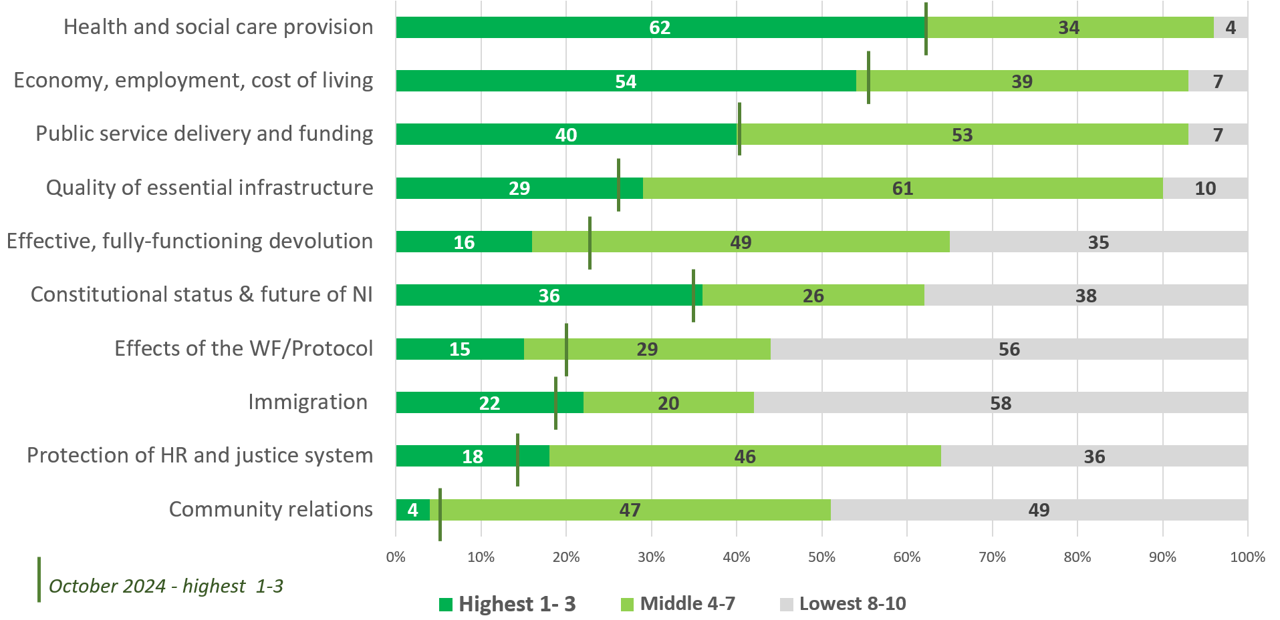
Figure 5. Relative Ranking of the Effects of the Windsor Framework as Top Three or Bottom Three in a List of Ten Policy/Political Issues (%)
For most respondents, priority concerns are health and social care provision, and the economy and cost of living. Over half of respondents (56%) placed the effects of the Windsor Framework among their bottom three issues of concern alongside community relations and protection of human rights and the justice system. This is in line with polls in 2024 (53-58%).
Independent Review of the Windsor Framework
In September 2025, Lord Murphy’s report on his Independent Review of the Windsor Framework was published. The poll asked respondents to rank recommendations made in the report (see Figure 6). The most popular recommendations were that the UK government should consider all possibilities to reduce frictions on the movement of goods from Great Britain to Northern Ireland (44% of respondents ranked it first or second) and that the UK Government and the NI Executive should emphasise ‘commercial benefits to Northern Ireland manufacturers of dual market access (38%). Ranked lowest was increasing the size of the Office of the Northern Ireland Executive in Brussels to monitor developments in the EU concerning the Windsor Framework (12%).
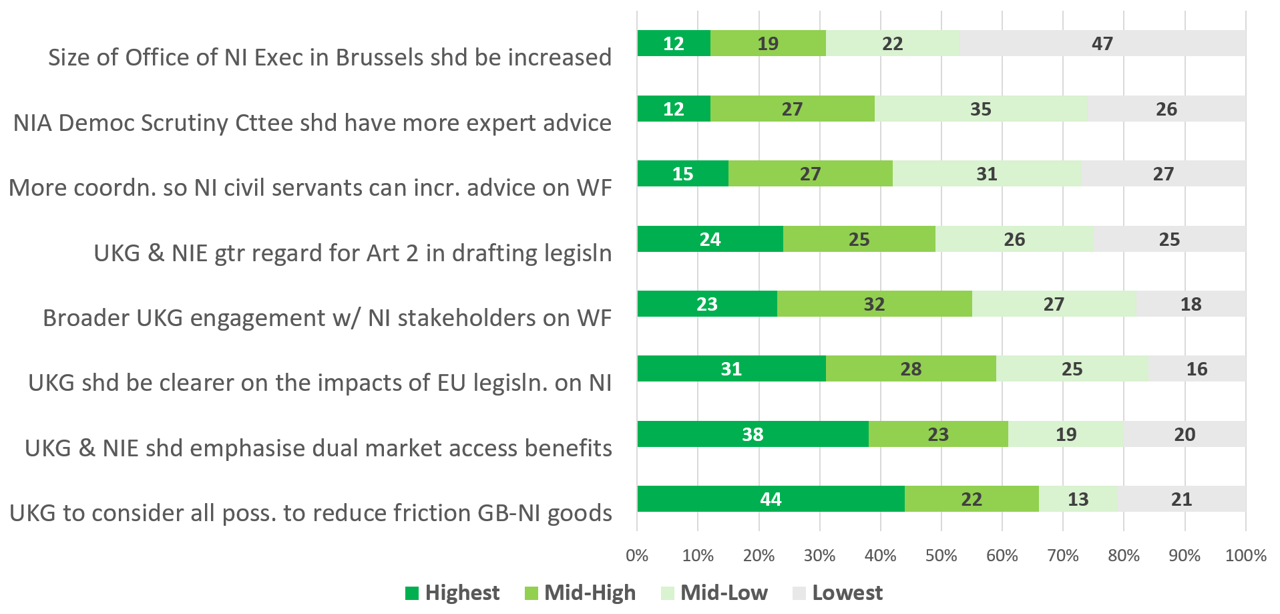
Figure 6. Relative Ranking of Recommendations from the Independent Review of the Windsor Framework (%)
The Future of the UK-EU Relationship
The final section of the poll focused on the future of the UK-EU relationship and the ‘renewed agenda’ for cooperation adopted by the UK-EU summit in May 2025. Respondents were asked to rank ten areas on which the UK and the EU agreed to closer cooperation (see Figure 7). The most highly prioritised area for UK-EU cooperation is in health security cooperation (e.g. to prevent against future pandemics and health crises); 59% ranked this in the top four out of ten priorities. The second area most voters would like prioritised in the UK-EU relationship is the establishment of a Common Sanitary and Phytosanitary Area; almost a third of respondents (31%) ranked this first or second and 53% placed it in their top four priorities. Voters were divided on the UK-EU intention to cooperate to reduce irregular migration: 29% ranked it in their top two priorities and 29% ranked it in their lowest two priorities.
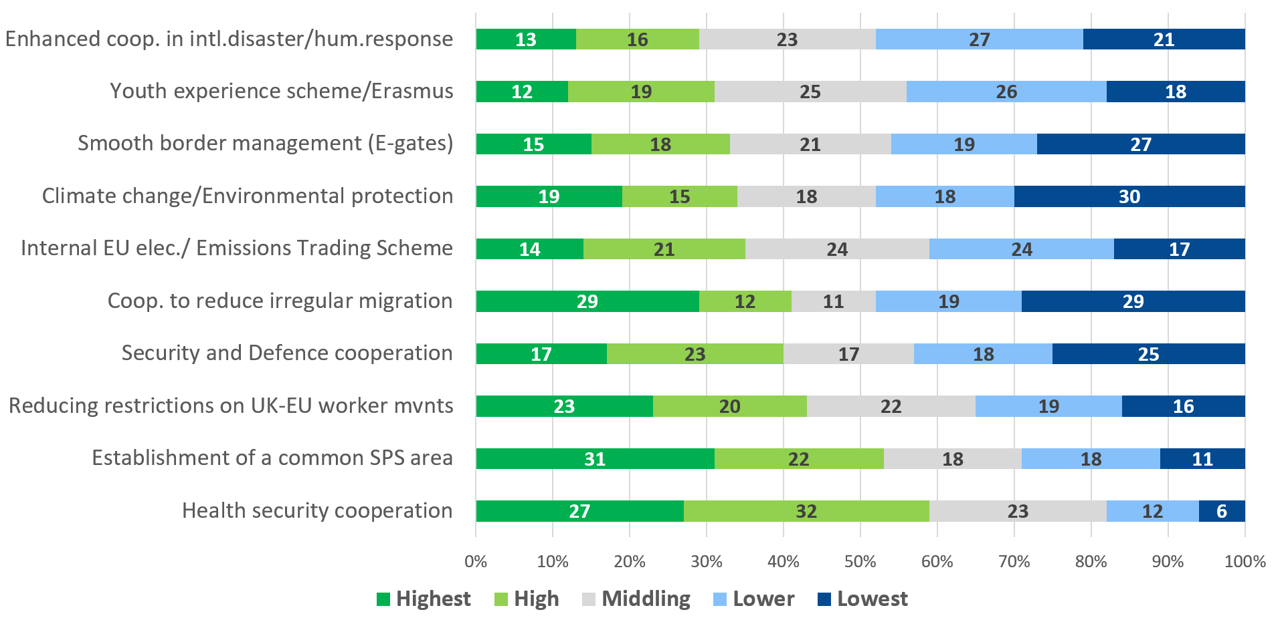
Figure 7. Relative Ranking of Priorities for closer UK-EU cooperation (%)
Written comments
We allow space at the end of the poll for respondents to leave any comments that they wish. While some respondents take the chance to comment on the questions and design of the poll, most of the 234 comments express opinions on the topic of Brexit/Windsor Framework, or related matters. They are a rich resource for giving more colour to some of the trends that are reflected in the quantitative data. Because the comments are not from the weighted sample, we cannot describe them as representative, but they do give an indication of some of the sentiments and opinions behind the figures. All the comments quoted here are verbatim.
There are, as with all previous polls, comments expressing negative views about Brexit. It is viewed as ‘a disaster’, with broken promises, economic harm, and political instability. Others support Brexit but feel it was poorly implemented or that Northern Ireland did not receive the full benefits.
“Brexit has been a complete disaster and we're still trying to repair the pointless damage done.” (82)
“Brexit has been and will continue to be an utter shitshow” (151)
“I’m a Brexiteer but we was sold something that isn’t this Brexit.” (99)
“Brexit is a good thing just needs properly implemented to lose all EU laws and echr etc.” (1)
“The Windsor Framework needs scraped altogether… NI didn’t get Brexit so the people of NI were robbed.” (48)
“We voted for Brexit, but got the Windsor Framework instead🙄” (62)
Many comments criticize the Windsor Framework for creating trade barriers and undermining Northern Ireland’s place in the UK. Some respondents see it as a deliberate step toward Irish reunification or a betrayal of the 1998 Agreement.
“The Windsor Agreement increasingly undermines the Union of Great Britain and Northern Ireland” (35)
“Stop trying to sell out Northern Ireland and preparing to hand it over to [the] republic” (183)
“The Windsor Framework drove a horse and coaches through the principle of consent set out in the GFA.” (53)
“The very existence of this internal UK [border] is breaking The Belfast Agreement which I now regard as null and void.” (105)
“The Protocol and WF are all designed to economically align NI with RoI, and bring forward the conditions for a united Ireland. They must be resisted!” (35)
“It was clearly imposed vindictively upon Northern Ireland by the European Union and Republic of Ireland at their behest. The effects of such has created an enormous amount of ill feeling towards both parties and has set community relations on the back foot …. Generations of Unionists will harbour resentment of all involved in the Windsor Framework and never forgive them” (93)
A further set of comments concern trade in goods and everyday frustrations. Respondents report difficulties ordering goods, increased costs, and red tape, and there are frustrations with postal delays and customs checks (including north/south). Some respondents wish to see more made of Northern Ireland’s ‘dual market access’ under the Windsor Framework. Others criticise the lack of information
“Being unable to purchase simple items from UK is very frustrating.” (29)
“You know the UK/NI link is broken when a £1-99 packet seeds from GB needs a £200 phytosanitary-sanitary certificate.“ (120)
“The bureaucracy that discourages GB retailers from dealing with potential customers in NI should be removed to the maximum extent possible.” (214)
“Do not want to find an alternative to UK goods from Ireland which seems to be what's happening. Costs going up and standards going down because of this.” (4)
“The impact on the postal service and "customs" checks between the Republic of Ireland and NI. Days from posting in Republic to delivery in NI is often up to 12 days. Is NI in the single market or not?” (14)
“Promotion of Northern Ireland’s position in relation to UK and EU access is not being shouted about across the globe enough.” (6)
“Our unique circumstance in Northern Ireland has been the biggest financial & economic opportunity ever for us. However our politicians have spectacularly failed to take advantage of this situation“ (157)
“Both the UK and N.I. governments should provide quick rebuttals to false claims put out by people and parties regarding the effects of the Windsor framework. i.e recent claim by TUV that customs forms were needed to post chocolates from GB to N.I. when the error was made by an ill informed GB post office.” (156)
Comments also reflect distrust in political institutions and leadership with respondents expressing dissatisfaction with the NI Assembly, the UK Government, and political parties.
“The devolved government in NI simply doesn't work.” (23)
“Our politicians should come together to embrace the Framework, rather than promoting division.” (24)
“The EU should have zero say in anything to do with Northern Ireland.” (54)
“The British governments have proven to be pro-Irish Republican, as are the Irish government, the USA and EU. There is no effective voice for Unionists at any level, other than the TUV, which I hadn't expected to ever be writing.” (78)
“The GFA now longer exists as its main Tenet has been broken. Not a single Unionist agrees with the Protocol or Windsor Agreement. I am Incandescent!” (138)
Other comments express scepticism about climate change, immigration, and EU governance; a few mention conspiracy-like fears about digital IDs or globalist agendas. And there are criticisms of the survey itself.
“Needs to be a 3rd world war to stop woke thinking.“ (195)
“I want nothing to do with the EU and I do not believe there is a climate crisis.” (59)
“The EU is a joke… a corrupt money grab.” (41)
“I believe the EU is dangerously influencing Digital IDs and the tyrannical control that this can permit.” (202)
“The Unionist parties should become persuaders of the republic to also leave the EU. Hopefully, when Reform UK forms the next Westminster Government, all immigrants and asylum seekers will be deported back to their country of origin.” (16)
“Your survey seems biased in favour of globalist policies. We see you.” (7)
“We are being dragged back into EU by the REMOANERS… We want nothing to do with military coalitions , Human Rights coalitions etc. Von Der Leyen is a War Monger. This Survey is Tainted.” (221)
This report is available to download here:
